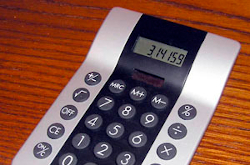계산기

Can you do the math: What is one hundred times four, divided by the square root of a hundred? If you know that, then you know the answer to this: How many years ago did three scientists at Texas Instruments invent the handheld electronic calculator?
The answer is forty. The scientists were Jerry Merryman, James Van Tassel and Jack Kilby. Their first device could add, subtract, multiply and divide. It had twelve bytes of memory -- close to nothing compared to today's highly powerful calculators. And it weighed more than a kilogram.
But it was powered by batteries. That meant it could be taken anywhere. Other electronic calculators had to be plugged into electricity. Not only that, they weighed close to twenty-five kilograms and were almost as big as typewriters.
In the United States, the National Council of Teachers of Mathematics says teachers at every level should support the use of calculators. Students are even permitted to use them when they take college entrance tests. That may surprise parents who still think of the days of paper-and-pencil only.
Yet after forty years, calculators in the classroom still add up to the same old debate. Some education experts think calculators are used too much. Children, they say, learn to depend on these electronic brains instead of their own.
Calculators may not only give students answers to questions they do not really understand, critics argue. They may also keep them from discovering ideas for themselves. The danger? Students who cannot even do simple addition and subtraction.
Other experts, though, say calculators have helped make mathematics more understandable to more students. They say calculators give students more time to understand and solve problems -- and to develop a better sense of what numbers mean. That way, the reasoning goes, they can study higher level ideas than they would otherwise. And they can feel better about their abilities.
What do teachers think? Generally they say calculators can be useful -- especially with more complex math. But they also say that young students should know basic operations before they begin using them.

